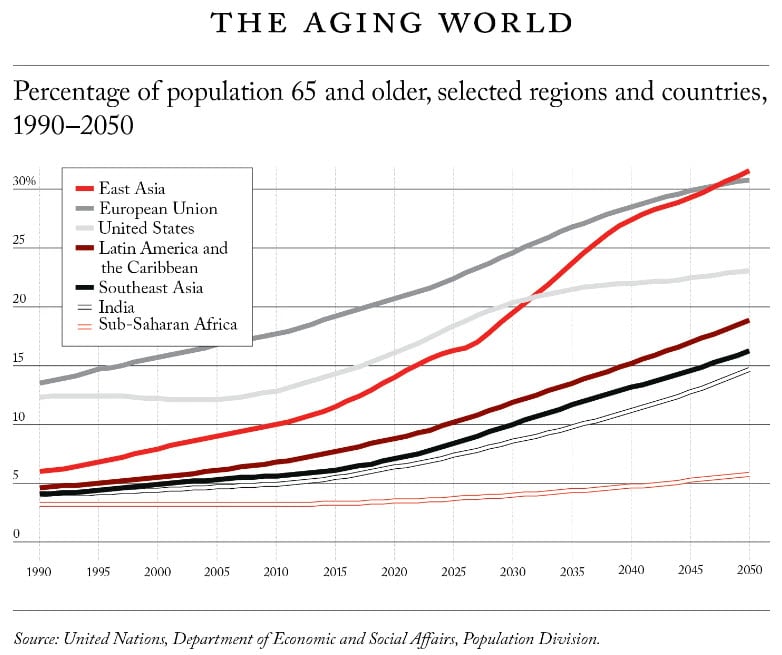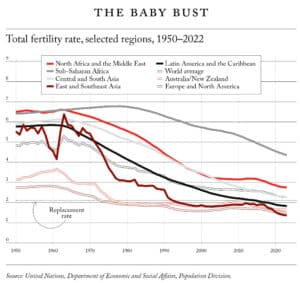
Top 10 Legal Practice Areas Impacted by the Coming Age of Depopulation
Posted on October 15, 2024 by Law Leaders
For the first time since the black death and plaque of the 1300’s the world’s population will decline. But this time it will not be led by deadly disease but rather by choice. As societies advance, the choice of having children have evolved from an economic asset of our more agrarian past to a modern-day financial liability for a growing number of families in most societies – leading to a decline in birth rates now referred to as the “age of depopulation.”
The coming age of depopulation, driven by a combination of declining birth rates and aging populations, is poised to significantly reshape various sectors of society, including the legal industry in the United States. According to the U.S. Census Bureau, by 2034, older adults (those aged 65 and older) are expected to outnumber children under 18 for the first time in U.S. history. Meanwhile, the total fertility rate in the U.S. has fallen to 1.64 children per woman as of 2020, well below the replacement level of 2.1 required to sustain population growth.
This coming age of depopulation—characterized by declining birth rates, aging populations, and shrinking workforces—could have profound impacts on many aspects of the legal industry. Below are 10 key areas of greatest expected influence:
- Estate Planning and Elder Law

As our populations age, there will be increased demand for services related to elder law, estate planning, and probate. Lawyers specializing in:
– Wills, trusts, and inheritance will see more clients planning for the transfer of wealth and assets.
– Elder care issues like healthcare directives, powers of attorney, guardianships, and Medicaid planning will become crucial.
– Disputes over estates may increase as assets become more concentrated in fewer hands and complex family dynamics arise with smaller, multi-generational families.
Depopulation can lead to labor shortages, which may shift the legal landscape in employment law:
– Labor protections: There may be an increase in litigation and regulation surrounding the rights of older workers as retirement ages are extended, and age discrimination could become a more common issue.
– Immigration law may also become a significant focus as many countries could look to immigration to replenish the workforce, creating more demand for legal services around immigration policy, visa applications, and labor law.
- Healthcare and Medical Law
An aging population will result in greater demand for healthcare services, which has legal implications:
– Medical malpractice claims might increase as the volume of medical procedures grows in response to an older population’s health needs.
– Healthcare regulations: Legal services may be needed for navigating healthcare laws, including long-term care facilities and assisted living arrangements.
– End-of-life care: Legal professionals may be involved in issues around euthanasia or assisted suicide, which could become more prominent debates in aging societies.
– Fewer marriages and divorces: Depopulation trends could result in fewer family law cases related to marriage, divorce, and child custody disputes.
– Adoption law: With declining birth rates, demand for adoption services may shift, and international adoption could become more complex and in demand.
– Surrogacy and reproductive law: As people delay childbirth or seek alternative means of having children, legal issues around fertility, surrogacy, and reproductive technologies may grow.
- Corporate and Commercial Law
– Business succession planning: As business owners age, there will be a greater need for legal guidance around succession planning, transferring business ownership, and ensuring continuity.
– Mergers and acquisitions: With a shrinking consumer base, some companies may consolidate or sell to survive, increasing the demand for M&A expertise.
– Workforce restructuring: Depopulation may lead to corporate restructuring and legal work related to labor shortages, downsizing, or automation of jobs.
- Litigation and Class Actions
With fewer young people, there may be fewer high-volume civil lawsuits in areas like:
– Personal injury: As the population ages, rates of certain types of accidents or injuries may decline (e.g., fewer young drivers), while other types (e.g., medical negligence in elder care) may rise.
– Consumer protection: With an older population, there may be shifts in class actions, particularly related to elder financial abuse or fraud targeting seniors.
- Real Estate and Land Use Law
Depopulation could lead to shifts in property values and land use patterns, impacting legal work in:
– Property transactions: Fewer homebuyers may lead to legal work involving real estate market adjustments, including distressed property sales or new laws around housing.
– Zoning laws: As urban populations shrink, there may be increased disputes around land use, zoning changes, and the repurposing of infrastructure for different uses (e.g., converting retail spaces into housing).
To offset population decline, some nations may adopt more open immigration policies, increasing the demand for legal services in:
– Work visas and residency permits as countries look to attract young workers from other regions.
– Legal integration of immigrants, including citizenship applications and issues surrounding labor rights and anti-discrimination.
- Pension and Social Security Law
With fewer young workers to support social security systems, governments might alter retirement benefits, which could lead to:
– Legal challenges around pension reform, benefit reductions, or privatization.
– Advisory roles for lawyers helping clients navigate changing pension systems and retirement planning strategies.
- Tax Law
Governments facing the fiscal strain of supporting aging populations may enact new tax policies:
– Inheritance taxes: As wealth becomes concentrated among the elderly, there may be new tax schemes to redistribute wealth, which would require legal expertise in estate tax planning.
– Corporate taxes: Businesses might face increased tax burdens to compensate for fewer taxpayers, leading to more corporate tax litigation and planning services.
Overall, depopulation will drive significant shifts in the demand for legal services, especially in areas related to aging, immigration, and workforce dynamics. Lawyers will need to adapt to new societal needs, focusing more on elder law, immigration, estate planning, and employment law to navigate these demographic changes.
 1-800-LAW-Leaders (529-5323)
1-800-LAW-Leaders (529-5323)